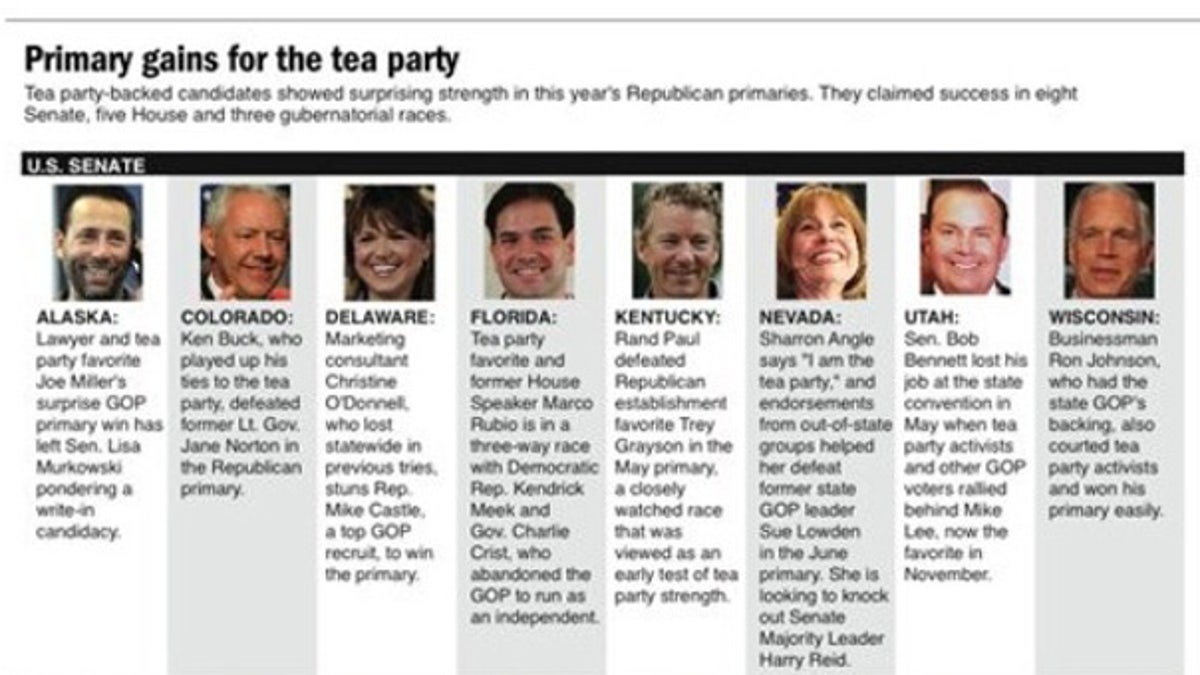
A list of tea party candidates who won primaries (AP)
The White House is pushing back on a report that President Obama's advisers are contemplating an all-out ad war to discredit Republicans by way of the Tea Party. But with the primaries now behind them, top Democratic officials have already made the Tea Party fear factor an integral part of their messaging.
Amid mounting predictions that Democrats could lose at least one chamber of Congress, a rhetorical campaign has been underway for weeks to cast the Republican Party as driven by the "extremist" faction of its conservative wing.
Warnings about the direction of the GOP got louder after dark-horse candidate Christine O'Donnell beat moderate Rep. Mike Castle for the Delaware Senate nomination last week and conservative Joe Miller beat incumbent Sen. Lisa Murkowski in the Alaska primary -- prompting Murkowski to launch a write-in campaign.
The New York Times reported Monday that Obama's advisers are considering whether to launch an ad campaign nationwide to portray the Tea Partiers as the new leaders of the Republican Party.
A senior White House official told Fox News the claim simply is not true, and Obama, attending an economic forum, said Monday that the "healthy skepticism" in government exhibited by Tea Partiers is a good thing.
But he criticized the approach, saying they're not looking at the cost of unpaid tax cuts and two wars in the last decade.
"I think they're misidentifying sort of who the culprits are here," he said, urging the groups to offer a more specific game plan. "It's not enough just to say get control of spending."
But conflating the grassroots conservative movement with establishment party politics is nothing new for the White House and top Democrats.
Vice President Biden for weeks has referred to the GOP as the "Republican Tea Party."
Two top Democratic political organizations, the Democratic National Committee and the Democratic Senatorial Campaign Committee, have taken a similar approach. DSCC Chairman Sen. Robert Menendez of New Jersey accused Delaware Republicans of picking an "ultra-right wing extremist" with the O'Donnell election last week.
The top of the DSCC website Monday morning featured a banner-sized photo of O'Donnell with the message: "Help fight the Tea Party machine."
DNC Chairman Tim Kaine also cast O'Donnell's election as a reflection of the Republican Party as a whole.
"You know, the Republicans, I think, merge with the Tea Party, and in many instances, they're finding out it's the Donner Party (19th century pioneers who resorted to cannibalism), because it's knocking off Republicans left and right and giving us opportunities to win some very tough seats that six months ago, we frankly thought we were probably not going to win," he told CNN on Sunday.
Democracy for America, a political organization founded by former Democratic Party Chairman Howard Dean, went on a tear against Tea Party candidates and activists in a fundraising e-mail Sunday.
"The Tea Baggers are everywhere!" the e-mail warned. The missive described those "extremists" as having a "weirdly racist tinge."
Democrats have been all too eager to portray the Republicans as a house divided, and in danger of falling, with the string of recent successes by Tea Party candidates. That plot thickened after Murkowski announced her write-in campaign on Friday, though Republican Party leaders condemned the move and said they would stick by Miller.
O'Donnell has come under fire for her history of financial problems and public statements on sex and morality. She once said in 2002 that "condoms will not protect you from AIDS," and she has described masturbation as sinful. Since winning the GOP primary, she's described such views as "personal" and suggested opponents are trying to "smear" her.
But aside from O'Donnell, most of the top Tea Party candidates are running even with or leading their general election opponents in the polls. Democrats could run a risk in centering a national strategy on Tea Party politics, given the movement's growing appeal among disenchanted voters.
Former President Bill Clinton, while expressing several concerns about the nature of the Tea Party movement, warned in interviews over the weekend that the Tea Party activists and candidates are feeding off "understandable" frustrations.
"I'm not sure it's going to be a good thing for Democrats yet," he said on CBS' "Face the Nation." "There is a general revolt against bigness."
He said on NBC's "Meet the Press" that some of those voting for Tea Party candidates are doing so on "really good impulses," like a concern that "ordinary people" are falling behind.
Clinton said he remains concerned the so-called Tea Party candidates would go too far, weakening government to the point where "there will be even more unaccounted for private concentration of power."












































